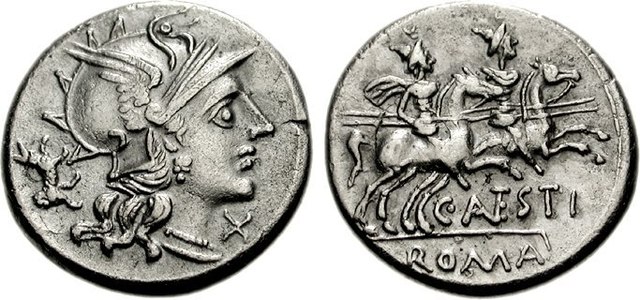Top Qs
Timeline
Chat
Perspective
Antistia gens
Ancient Roman family From Wikipedia, the free encyclopedia
Remove ads
The gens Antistia, sometimes written Antestia on coins, was a plebeian family at ancient Rome. The first of the gens to achieve prominence was Sextus Antistius, tribune of the plebs in 422 BC.[1][2][3]

Origin
Tradition indicates that the Antistii came to Rome from Gabii, an ancient Latin town a short distance to the east. According to Dionysius of Halicarnassus, Antistius Petro, leader of Gabii, concluded a treaty with Lucius Tarquinius Superbus, the seventh and last King of Rome.[4][5] Moreover, the gens may have claimed descent from the Alban kings since Gabii was an Alban foundation and the name 'Antistius' was claimed to derive from Antho daughter of Amulius, king of Alba and uncle of Romulus and Remus.[i][7]
Remove ads
Praenomina
The oldest branches of the gens Antistia used the praenomina Sextus, Aulus, Lucius, and Marcus. In the later Republic, members of the gens also used Publius, Titus, and Gaius. The Antistii Veteres used primarily Gaius and Lucius. One Quintus appears in the imperial era.
Branches and cognomina
In the earlier ages of the Republic, none of the members of the gens appear with any surname, and even in later times they are sometimes mentioned without one. The surnames under the Republic are Gragulus, Labeo, Reginus, and Vetus. The last of these, the Antistii Veteres, were the greatest of the Antistii. In 29 BC, Octavian elevated this family to the patriciate.[1][8] They held several consulships from the time of Augustus to that of Antoninus Pius.
Gragulus refers to a jackdaw (graculus in Latin), which is displayed on the bronze coins of the only known Antestius with this cognomen.[9]
Members
- This list includes abbreviated praenomina. For an explanation of this practice, see filiation.
- Antistius Petro of Gabii, said to have concluded a treaty with Rome in 510 BC, during the reign of Tarquin the Proud.[4][5]
- Sextus Antistius, tribune of the plebs in 422 BC.[10][2]
- Aulus Antistius, tribune of the plebs in 420 BC.[11]
- Lucius Antestius, consular tribune in 379 BC.[10][12][13][14][15]
- Marcus Antistius, tribune of the plebs circa 320 BC.[10][16][17]
- Marcus Antistius, sent in 218 BC to the north of Italy to recall Gaius Flaminius, the consul elect, to Rome. Possibly fictitious.[10][18][19][20]
- Lucius Antistius, legate sent to Sicily in 215 BC.[21][22]
- Sextus Antistius, sent in 208 BC into Gaul to watch the movements of Hasdrubal.[10][23][24]
- Gaius Antestius, triumvir monetalis in 146 BC. His coins feature a puppy, which, according to Crawford, might have stood for the surname Catulus.[25]
- Antistia, wife of Appius Claudius Pulcher, and mother-in-law of Tiberius Gracchus.[10][26]
- Lucius Antestius Gragulus, triumvir monetalis in 136 BC.[9]
- Publius Antistius, tribune of the plebs in 88 BC, and a prominent orator, put to death by order of the younger Marius in 82.[10][27][28][29][30][31][32][33]
- Antistia P. f., daughter of the orator, and the first wife of Pompeius, who, after her father's assassination, divorced her at Sulla's instigation.[10]
- Antistius, a prosecutor of old age who fell victim to Sulla's proscriptions.[34][35]
- Lucius Antistus, tribune of the plebs in 58 BC, attempted to prosecute Caesar, but was prevented from doing so by the other tribunes.[36]
- Titus Antistius, quaestor in Macedonia in 50 BC, remained neutral during the Civil War.[10][37][38]
- Antistius, the physician who examined the body of Caesar after his murder in 44 BC.[10][39]
- Marcus Antistius Labeo, a jurist in the time of Augustus. An opponent of the triumvirs, he refused the consulship offered by Augustus because of his political views.[40]
- Antistius Sosianus, praetor in AD 62, banished at the commencement of Nero's reign.[41][42]
- Lucius Antistius Rusticus, consul suffectus in AD 90.[43][44]
- Gaius Antistius Auspex, eques and governor of Noricum in the first half of the second century AD.[45]
- Quintus Antistius Q. f. Adventus Postumius Aquilinus, a general under Lucius Verus, who later served as governor of Roman Britain from about AD 175 to 178.[46][47]
- Antistius Capella, one of the tutors of Commodus.[46]
- Lucius Antistius Burrus, son-in-law of Marcus Aurelius, he was consul in AD 181, but put to death in 188 for joining a conspiracy against Commodus.[46][48]
- Antistius, a writer of Greek epigrams, three of which are preserved in the Greek Anthology.[10][49]
- Tiberius Antistius Fausti f. Marcianus, a military tribune with the fifteenth legion, not earlier than the latter half of the second century.[50]
Antistii Regini
Antistii Veteres
- Antistius Vetus, praetor about 70 BC, and propraetor in Hispania Ulterior about 68, under whom Caesar served as quaestor.[57][58][59][60]
- Antistius Vetus, tribune of the plebs in 56 BC.[61]
- Gaius Antistius Vetus, a supporter of Caesar, and consul suffectus in 30 BC.[62][63][64][65][66][67]
- Gaius Antistius C. f. Vetus, pontifex, and consul in 6 BC. Son of the consul of 30 BC[57][68]
- Gaius Antistius C. f. C. n. Vetus, consul in AD 23; son of the consul of 6 BC.[57][69][70]
- Lucius Antistius C. f. C. n. Vetus, pontifex, and consul suffectus in AD 26; son of the consul of 6 BC.[57][71]
- Camerinus Antistius (C. f. C. n.) Vetus, consul suffectus in AD 46.[72]
- Gaius Antistius (C. f. C. n.) Vetus, consul in AD 50, during the reign of Claudius.[73][74]
- Lucius Antistius (C. f. C. n.) Vetus, consul in AD 55.[75]
- Antistia L. f. (C. n.) Pollitta, wife of Gaius Rubellius Plautus.[76]
- Gaius Antistius Vetus, consul in AD 96.[77][78][79]
- Antistius Vetus, consul in AD 116.[80][81][82]
- Antistius Vetus, consul in AD 150.[80][81][82][83]
Remove ads
See also
Footnotes
- See Plutarch, "The Life of Romulus", 3, 4. On this claim see 'Ethnic Identity and Aristocratic Cmopetition in Republican Rome', Gary D. Farney, Cambridge University Press, 2007, 288-9. Two inscriptions name a Lucius Antistius as a member of the Salii Albani.[6] On this priesthood see M.G. Granino Cecere, "Sacerdotes Cabenses e sacerdotes Albani", pp. 275–289.
References
Bibliography
Wikiwand - on
Seamless Wikipedia browsing. On steroids.
Remove ads
